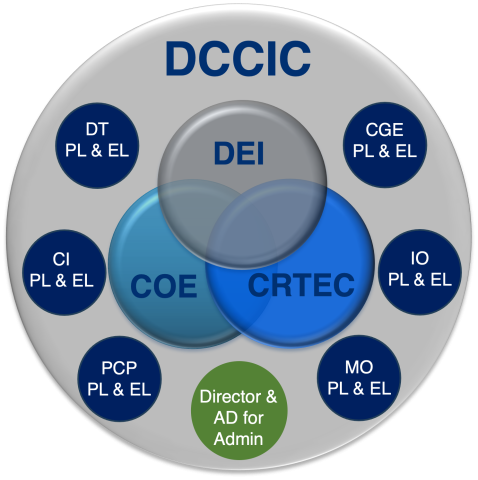Consortium Partnerships and Engagement
Our approach is holistic. We collaborate and engage with consortium partner Offices of DEI—Case Western Reserve University School of Medicine, University Hospitals, and Cleveland Clinic—to ensure alignment of goals and cohesive unity that foster inclusivity and a more equitable workforce in cancer research and care.
Collaboration between the Offices of DEI, COE, & CRTEC and Integration with Scientific Research Programs
Additionally, the cancer center's Offices of DEI, Community Outreach and Engagement (COE), and Cancer Research Training and Education Coordination (CRTEC), in collaboration with the cancer center's scientific research programs, have formed the DEI/COE/CRTEC Integration Committee (DCCIC). The DCCIC provides a forum to integrate the critical cancer center activities of DEI, COE, and CRTEC initiatives and establishes bi-directional communication with the scientific programs. The goal is to ensure the development of initiatives that benefit all stakeholders within the center and address community needs in the catchment area.
Resources
- Case CCC COE
- Case CCC CRTEC
- Case Western Reserve University's (CWRU) Office for Diversity, Equity, and Inclusive Engagement
- CWRU School of Medicine's (SOM) Office of Diversity, Equity, and Inclusive Excellence
- CWRU SOM Clinical and Translational Science Collaborative's (CTSC) Office of Diversity, Equity, Inclusion, and Accessibility
- University Hospitals Cleveland Medical Center’s Office of Community Impact, Equity, Diversity, and Inclusion (CEDI)
- Cleveland Clinic’s Office of Diversity and Inclusion
National Partnerships
Case CCC’s Office of DEI has formed a reciprocal relationship with Howard University, an HBCU (Historically Black College/University) in Washington, D.C. Building on CWRU’s Graduate Student North Star Award program, this initiative aims to foster, promote, and establish a mutually beneficial partnership between our cancer center and Howard University that enhances diversity in the biomedical research workforce and builds cancer research capacity at both institutions to advance cancer research and health equity.
Case CCC and Howard University, over time, will increase their capacities for cancer research, build trust with communities that the medical establishment has long marginalized, encourage participation in clinical trials, improve the number of underrepresented investigators in cancer and cancer health disparities research, and invigorate cancer health disparity research and outreach to Case CCC’s underserved and historically overlooked populations in our catchment area.



